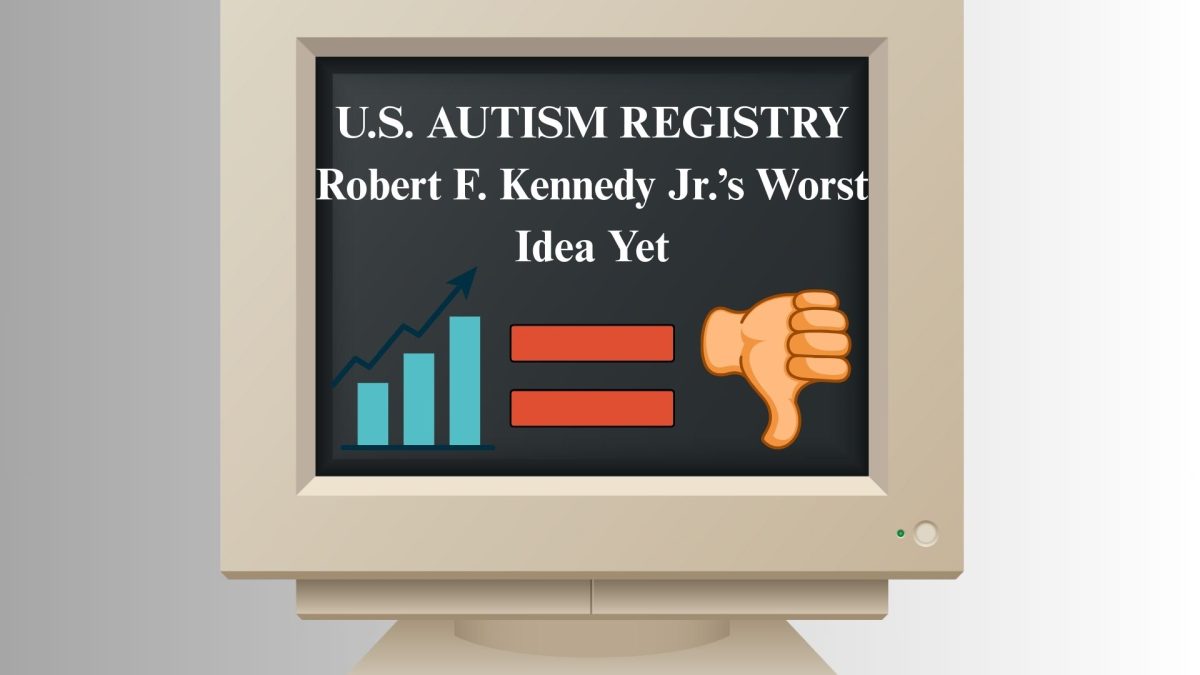At a press conference on April 16, Secretary of Health and Human Services Robert F. Kennedy Jr. took heat for comments he made about a topic he has long had an embattled relationship with: Autism Spectrum Disorder, or ASD. In a move that has sparked widespread outrage, Kennedy called autism “an individual tragedy” that “destroys families.” According to Kennedy, many Americans who are on the autism spectrum will never be able to pay taxes, hold jobs, date others, or even use the toilet.
Many other autistic Americans (including cast members of Love on the Spectrum, who are, famously, autistic people who date others), and allies of the community, have already lambasted these comments, but they aren’t even the worst part of the press conference. That dishonor goes to Kennedy’s announced plans to create an “autism registry,” using data from sources ranging from Medicare and Medicaid databases to personal fitness apps, in an effort to determine the cause of autism by September of this year. While calling autism an “individual tragedy” is almost calculated to stigmatize autistic people, this database will be able to do so more successfully, and the results could be catastrophic for Americans on the spectrum.
In context, the U.S. government has already been a major financial contributor to research into ASD. “In 2019 and 2020, the most recent period for which data are available, federal grants totaling $350 million supported 82.5% of U.S. autism research, with the remainder coming from private sources,” according to the L.A. Times.
However, Helen Tager-Flusberg, a professor emerita at Boston University and member of the Interagency Autism Coordinating Committee (which advises HHS on autism-related research), told the Times that this funding has in large part been cut, whereas a total of $50 million is slated to be spent on the development of the database. Moreover, the IACC has not been kept in the loop about a research project that would presumably fall within their remit.
In and of themselves, such failings might simply suggest that Kennedy is incompetent. But taken alongside his track record of spreading misinformation about autism, Kennedy’s proposed autism-registry project seems set to undermine the very credibility of existing research into neurodivergence. According to the Autism Science Foundation, at the April 16 press conference, Kennedy claimed autism was influenced by “environmental toxins,” despite that, in The Guardian’s words, autism has “already been identified as genetic in the vast majority of cases.” While it’s true that non-genetic factors may increase the chances that one is born on the autism spectrum, Kennedy makes these factors out to be far more influential and definitive than they truly are. Combined with the aforementioned defunding of existing autism research, this misrepresentation has the potential to undermine current medical understanding of autism spectrum disorder, potentially increasing stigma around the condition. Ryan Smith, an Idaho father of two neurodivergent children, told The Guardian that he created a petition against the establishment of an autism database in part because he felt that such a project “could worsen stigma around autism, and…keep individuals and families from seeking diagnoses and care.”
But the response of some Americans to Kennedy also deserves attention. Here, I want to circle back to Kennedy’s description of how people on the autism spectrum supposedly can’t use the bathroom, pay taxes, and so forth. Because the fact is, to some Americans, this characterization resonates. The Detroit Free Press quotes Michigan resident Joel Troyer, who professed to “hate” the way autism manifests in his 12-year-old, nonverbal autistic son, Landry. Troyer told the newspaper, “I’ve gone through a divorce[,] and much of that had to do with the financial stress” of treating Landry’s gastrointestinal problems (which those on the autism spectrum are more likely to have, according to the Mayo Clinic).
Troyer added, “It’s the burden of autism, not the burden of my son.”
I will admit that some autistic people do need more help from others in order to navigate the world and live a satisfying life, and for their caretakers, the demands of their role can be stressful. It’s valid for those caretakers to feel frustrated about how much they have to do for others.
But autism is not a curable condition, and frankly, it shouldn’t be. To love an autistic child is to appreciate the way their mind works–even if they face limitations in a neurotypical-centered society. This doesn’t mean the demands of caring for them aren’t difficult, but it does mean that you shoulder them anyway, because that’s the price you pay for being a parent. The danger of Kennedy treating autism as a burden is that it may resonate with parents who struggle to care for their children on the spectrum, negatively influencing their understanding of how to treat or support their children.
As I’ve written about before, many advances in how people with disabilities are viewed and treated have only come relatively recently. This means that America continues to develop an understanding of what disabilities, including being on the autism spectrum, look like, and how to respond to them. It’s a long, confusing process, and all Americans will likely deal with it at some point. Even I am still learning. But Kennedy’s treatment of people on the autism spectrum helps exactly no one. Whatever further questions science investigates about people on the autism spectrum, it needs to build off of prior research, be conducted by and alongside willing autistic people, and be used to improve our lives. The failure of Kennedy’s autism registry plan to check any of these boxes bodes poorly for the continuing treatment of Americans on the spectrum.









